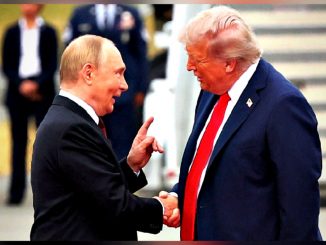
The logo of the Organisation for the Prohibition of Chemical Weapons (OPCW) is seen during a special session in the Hague, Netherlands June 26, 2018. REUTERS/Yves Herman/File Photo Purchase Licensing Rights
| Published July 9, 2025
As the brutal conflict between Ukraine and Russia grinds into its third year, a new and alarming accusation has emerged—one that could significantly shift the moral and legal dimensions of the war. On July 8, 2025, Ukraine formally called on the Organisation for the Prohibition of Chemical Weapons (OPCW) to launch a full investigation into what it claims is the systematic use of banned chemical agents by Russian forces. Backed by recent intelligence from European allies, Kyiv’s appeal signals growing international concern over the possible normalization of chemical warfare on European soil—a development that, if proven, would constitute a serious breach of international law and the Chemical Weapons Convention.
🇺🇦 Ukraine’s Call for a Chemical Weapons Probe
On 8 July 2025, Ukraine formally requested that the Organisation for the Prohibition of Chemical Weapons (OPCW), based in The Hague, launch a full, independent investigation into allegations that Russian forces have deployed banned toxic munitions on the battlefield
📌 Context & Evidence
-
Dutch and German intelligence: Shared findings that indicate a widespread, systematic use of chemical weapons—including drone-dropped choking agents designed to force Ukrainian troops from trenches
-
Linked to at least three confirmed deaths and over 2,500 reported symptoms among Ukrainian personnel, according to military and health sources
-
Ukraine’s petition asks the OPCW director-general to establish a mechanism to collect evidence and identify perpetrators, sponsors, and organizers
⚖️ Why It Matters
-
This would mark a significant escalation in international scrutiny, reminiscent of the 2018 OPCW team investigating chemical weapons in Syria
-
Previous OPCW investigations had ruled earlier accusations “insufficiently substantiated,” but this request is based on new, credible intelligence
-
The push comes during a four-day closed-door session of the OPCW’s 41‑member Executive Council
🌍 Wider Repercussions
-
The UK moved ahead with sanctions on two individuals and one entity connected to Russia’s chemical defense units under its chemical weapons regime
-
Remarks by officials from the Netherlands, Germany, and Ukraine emphasize that this is not isolated—but rather “normalized, standardized and widespread” use of chemical agents .
🧪 Historical Timeline
-
Reports of chemical weapon use date back to late 2022, including documented uses of tear gas and chloropicrinThe OPCW has already acknowledged multiple violations in 2023–2025, including instances involving tear gas and chloropicrin .
-
July 2025 brought fresh intel from Dutch and German agencies regarding mass-scale use by Russian forces
🔍 What Happens Next?
-
OPCW Executive Council—currently meeting—will decide whether to establish the requested Investigation and Identification Team, similar to past Syria investigations.
-
If approved, this could lead to traceable evidence: identifying who, how, and where chemical agents were deployed.
-
A confirmed finding could prompt an international push for further sanctions, accountability, and possibly a referral to the UN Security Council.
🧨 Resulting Effects of the Alleged Chemical Weapons Use
The alleged deployment of chemical weapons by Russian forces has had serious and far-reaching consequences—both on the battlefield and in the international arena:
👥 Health and Human Impact
-
Ukrainian frontline soldiers have reported symptoms consistent with exposure to choking agents and tear gas derivatives, including respiratory distress, nausea, dizziness, and chemical burns.
-
Ukrainian officials confirmed that at least three soldiers have died, and over 2,500 troops have reported chemical-related illnesses since these attacks allegedly began.
-
Medical teams near the frontlines are now being equipped with additional protective gear and antidotes, slowing down already strained response operations.
⚔️ Tactical and Psychological Warfare
-
The use of chemical agents—delivered through modified drones and grenades—has made it harder for Ukrainian forces to hold defensive trench positions, contributing to temporary tactical Russian gains.
-
Morale among soldiers has been shaken, as chemical attacks evoke strong fear due to their painful effects and historical association with war crimes.
🌍 Diplomatic Fallout
-
Ukraine’s OPCW appeal places further pressure on Russia and signals to the international community that the conflict may be escalating into prohibited warfare under international law.
-
Western allies such as the United Kingdom, Germany, and the Netherlands have voiced support for Ukraine’s claims, with the UK announcing fresh sanctions against individuals linked to Russian chemical defense units.
⚖️ Potential Legal Ramifications
-
If the OPCW confirms the use of banned chemical weapons, this could be grounds for future prosecutions under international humanitarian law.
-
It may also trigger calls for UN Security Council action, though Russia’s veto power complicates enforcement.
💣 Impact on Military Aid and Global Perception
-
Allegations of chemical weapons use may push NATO allies to increase military and humanitarian aid, justifying enhanced defensive shipments.
-
Public perception in Europe and North America could further harden against Russia, reinforcing Ukraine’s position as a victim of international law violations.
 Bottom Line:
Bottom Line:
The allegations of chemical weapons use by Russian forces represent a grave escalation in an already devastating war. If confirmed, these actions would not only violate international treaties but also set a dangerous precedent for modern warfare—where banned agents are deployed with impunity. Ukraine’s urgent appeal to the OPCW underscores both the severity of the threat and the need for accountability. As the international community watches closely, the coming investigation may determine more than just the truth behind battlefield tactics—it may shape the future of global norms, deterrence, and justice in times of war.





Be the first to comment